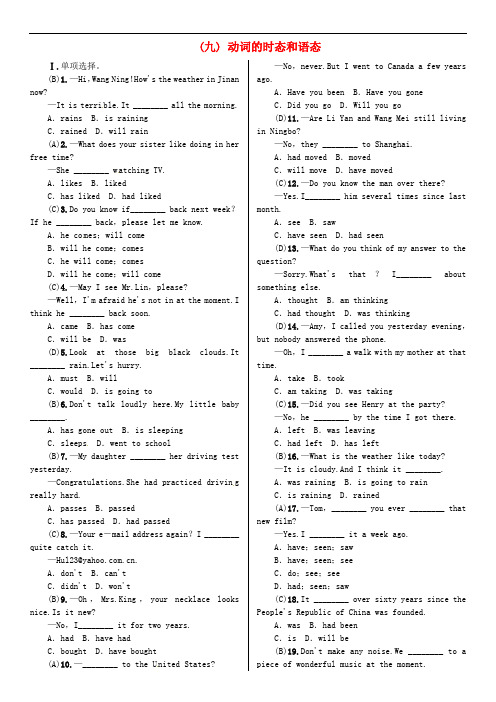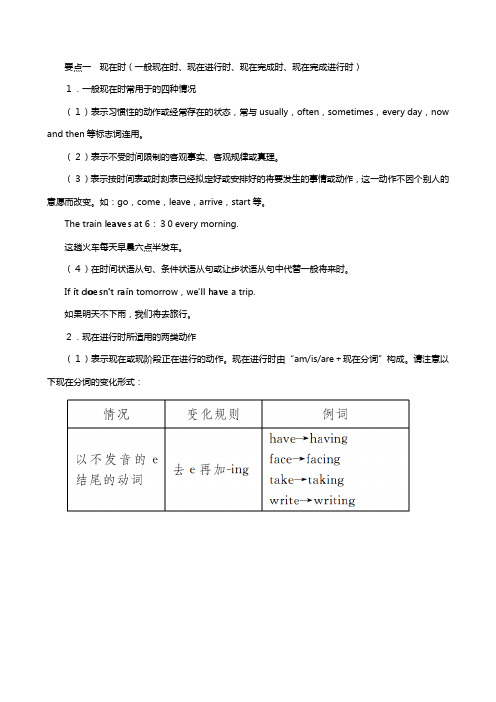[外研版]2013届高考英语一轮复习语法专题9 正反解读动词的时态和语态
高考英语复习 语法专题九正反解读动词的时态、语态精品课件

例句 ①They have cleaned the classroom. (即: The room is clean now. ) ②He has lived in this country for 40 years. ③Once you have made a promise, you shouldn't break it. ④It is the first time that I have been here.
专题九 │ 正面解读
类别 意义 例句
过 过 1.表示过去某一时间正进行的动作 。通 ①As she was reading the 去 去 常有时间状语(从句),或有上下文提示。 newspaper, Granny fell 时 进 2.与副词always, continually, constantly, 态 行 never等连用时表示厌恶或赞扬等的感 时 情色彩。3.go,come,leave,start, asleep.②My grandfather was always forgetting things. ③Mr. Smith said
专题九 │ 正面解读 类别 现 在 时 态 现 在 完 成 时
意义 1.现在完成时的两种意义:①表示动作发生于过去,对现在有一 定的影响或结果。②表示动作或状态过去已经开始,持续到现在 而且可能继续下去。 2.短暂性动词在肯定句中不可与表示时间段的for, since等连用。 3.可用在表时间、条件、让步的状语从句中,表示将来某时以前 已完成的动作。 4.在It is the first/ second … time that…句型中,that从句的谓语动词 用现在完成时。
专题九 │ 正面解读
在解题时要注意以下几个问题: 1. 这个动作可能发生在什么时间?题干中可 参照的时间信息有哪些? 2. 这个动作处于什么状态?是进行中,还是 已结束(完成)?限制或修饰这个动作的状语 信息有哪些? 3.这个动作与主语的关系,是主动还是被动? 只要全面细致地考虑了这些问题,试题的答 案也就水落石出了。
高考英语复习语法专项一、动词的时态和语态课件外研版

解题关键: 根据句中动词suggest, is可知, 应指目前的想 法, 应用一般现在时。 答案判定: thought改为think
②(2015·全国卷Ⅱ)This cycle________(go)day after day. The walls warm up during the day. (填空)
(4)在时间、条件等状语从句中常用一般现在时代替一 般将来时。 *You will surely succeed if you try your best.
【典例剖析】 ①(2016·全国卷Ⅱ)Some classmates suggest we go to places of interest nearby. I thought that it is a good idea. (改错)
语法精讲强化系列 一、动词的时态和语态
考点1 一般时态 1. 一般现在时 (1)表示习惯性、经常性发生的动作或存在的状态, 常 与表示频度的时间状语连用, 如usually, often, always, sometimes, every day等。 *On Monday morning it usually takes me an hour to drive to work.
(2)表示客观事实、真理、格言或者警句等。 (3)表示按照时间表、计划安排好的或者规定的行为, 只限于go, come, leave, start, stop, arrive, begin, return, open, close等表示动作趋向性或移动意义的词。 *My dream school starts at 8: 30 a. m. and ends at 3: 30 p. m.
*They’ve gone to Paris so far. 他们目前已经去巴黎了(说明他们现在不在这里)。 *They went to Paris last year. 他们去年去过巴黎(只说明去过, 不表明是否现在仍在 那里)。
高考英语一轮复习外研版高中英语各单元语法汇总表

定从(3)
介词+which/whom
-ing/-ed作宾补
省略
现在完成进行时
状语从句:no matter-/-ever
复习:非谓作定语、状语、宾补
复习:情态动词
1一般现在时,现在进行时,过去时,一般将来时,现在完成时
2beable to/have to/had better/ needn’t③could/ must/might
-ing作主语
过去进行时被动
主谓一致
复习:状语从句
Unit 4
定从(1)
关系代词
-ing作-ed作表语
It作形式主语
主谓一致
复习:定语从句
Unit 5
定从(2)
关系副词
-ing作定语
过去将来时
过去完成时
It作形式宾语
复习:非谓作主语、宾语、表语
复习:名词性从句
新外研社高中英语语法汇总表
必修一
必修二
必修三
选必一
选必二
选必三
选必四
Unit1
基本句型
情态动词②
-ed作状语
非限定从
将来进行时
主语从句
复习:时态
Unit2
构词法
情态动词③
-ed作定语
-ing/to do作宾语
过去完成时被动
表语从句
复习:被动语态
Unit 3
时态①
To to做定语和结果状语
现在完成时被动
高考英语一轮复习 动词的时态及语态讲解

高考英语一轮复习讲解:动词的时态及语态【知识要点】动词的时态一、一般现在时的用法1.经常性或习惯性的动作,常与表示频度的时间状语连用。
时间状语:every...,sometimes,on SundayI leave home for school at 7 every morning.我每天早上七点离家去学校。
2.客观真理,客观存在,科学事实。
The earth moves around the sun.地球围着太阳转。
Shanghai lies in the east of China.上海位于中国的东方。
3.表示格言或警句中。
Pride goes before a fall.骄者必败。
注意:此用法如果出现在宾语从句中,即使主句是过去时,从句谓语也要用一般现在时。
Columbus proved that the earth is round.哥伦布证明地球是圆的。
4.现在时刻的状态、能力、性格、个性。
比较:Now I put the sugar in the cup.现在我往杯子里放糖。
I am doing my homework now.我在做作业。
第一句用一般现在时,用于操作演示或指导说明的示范性动作,表示言行的瞬间动作。
再如:Now watch me,I switch on the current and stand back. 第二句中的now是进行时的标志,表示正在进行的动作的客观状况,所以后句用一般现在时。
二、一般过去时的用法1.在确定的过去时间里所发生的动作或存在的状态。
时间状语有:yesterday,last week,an hour ago,the other day,in 1982等。
Where did you go just now?刚才你去哪儿了?2.表示在过去一段时间内,经常性或习惯性的动作。
When I was a child,I often played football in the street.我小的时候,经常在街上踢足球。
[外研版]2013届高考英语一轮复习语法专题12_正反解读状语从句
![[外研版]2013届高考英语一轮复习语法专题12_正反解读状语从句](https://img.taocdn.com/s3/m/1d916ef19e314332396893ed.png)
专题12 │ 考点归纳
• Tom was about to close the window when his attention was caught by a bird. • 汤姆正要关上窗户,就在这时一只鸟引起 了他的注意。 • 规则1:when 通常意为“当……时候; 正 在那时……”;be about to…when…意为 “正要……这时……”。 while从句只能用延 续性动词,意为“在……期间”。as 表示 主句和从句的动作几乎同步进行,意为 “一边……,一边……; 随着……”。如:
专题12 │ 考点归纳
• ► 考点三 地点状语从句 • 通常由连词where和wherever引导,从 句可位于主句之前,也可位于主句之后。如: • The little girl who got lost decided to remain where she was and wait for her mother. • 那个迷路的小女孩决定待在原地等她母 亲。 • Keep in touch with your family members wherever you are in the world.
专题12 │ 考点归纳
• 规则5:no sooner…than 和hardly… when/before引导的从句表示“刚…… 就……”。主句中的动词一般用过去完成时, 从句用过去时。若把no sooner, hardly提到 句首,主句需倒装。如: • No sooner had he sat down than the phone rang. • 他刚坐下,电话铃就响了。 • Hardly had the game begun when it started to rain.
专题12 │ 考点归纳 考点归纳
【志鸿优化设计】高考英语一轮复习 语法专题 动词的时态和语态 外研版

语法专题二动词的时态和语态动词的时态分为三时四体。
三时指现在、过去和将来;四体指一般、进行、完成和完成进行。
常考时态为一般过去时、一般现在时、一般将来时、过去进行时、现在进行时、将来进行时、过去完成时、现在完成时和将来完成时等。
动词的语态分为两种:主动语态和被动语态。
考点一一般现在时1.表示一个习惯性、经常性、现在反复出现的动作或状态。
He always comes first.2.表示永恒的状态或真理。
The moon moves around the sun once every month.3.在时间、条件、让步状语从句中,如果主句中的动词用一般将来时,从句中的动词通常用一般现在时,而不用将来时态。
We'll stay at home if it rains.4.动词go,come,start,begin,leave,arrive,return,be等的一般现在时,可用来代替将来时,表示事先已计划或安排好的将要发生的动作或状态。
The live football match starts at 9 o'clock this evening.5.时间表、时刻表、日程表、节目单、课程表等按规定将要发生的动作,用一般现在时代替一般将来时。
The train leaves at 8 o'clock.考点二一般将来时1.be going to表示说话者明确的打算或确信会发生,多用于口语。
1)表示现在打算或计划将来要做的事。
I'm going to buy a new bike.2)表示根据某种迹象认为在最近或将来要发生的事。
It looks as if it is going to rain.2.be to表示安排好要发生或命令做什么。
1)表示预先安排好的计划或约定。
I am to meet Tom this evening.2)表示说话人的意志、意图、职责、义务、命令。
中考英语复习 语法专题训练(九)动词的时态和语态 外研版

(九) 动词的时态和语态Ⅰ.单项选择。
(B)1.—Hi,Wang Ning!How's the weather in Jinan now?—It is terri ble.It ________ all the morning.A.rains B.is rainingC.rained D.will rain(A)2.—What does your sister like doing in her free time?—She ________ w atching TV.A.likes B.likedC.has liked D.had liked(C)3.Do you know if________ back next week?If he ________ back,please let me know.A.he co mes;will comeB.will he come;comesC.he will come;comesD.will he come;will come(C)4.—May I see Mr.Lin,please?—Well,I'm afraid he's not in at the moment.I think he ________ back soon.A.came B.has comeC.will be D.was(D)5.Look at those big black clouds.It ________ rain.Let's hurry.A.must B.willC.would D.is going to(B)6.Don't talk loudly here.My little baby ________.A.has gone out B.is sleepingC.sleeps D.went to school(B)7.—My daughter ________ her driving test yesterday.—Congratulations.She had practiced drivin g really hard.A.passes B.passedC.has passed D.had passed(C)8.—Your e-mail address again?I ________ quite catch it.—Hul23@.A.don't B.can'tC.didn't D.won't(B)9.—Oh,Mrs.King,your necklace looks nice.Is it new?—No,I________ it for two years.A.had B.have hadC.bought D.have bought(A)10.—________ to the U nited States?—No,never.But I went to Canada a few years ago.A.Have you been B.Have you goneC.Did you go D.Will you go(D)11.—Are Li Yan and Wang Mei still living in Ningbo?—No,they ________ to Shanghai.A.had moved B.movedC.will move D.have moved(C)12.—Do you know the man over there?—Yes.I________ him several times since last month.A.see B.sawC.have seen D.had seen(D)13.—What do you think of my answer to the question?—Sorry.What's that?I________ about something else.A.thought B.am thinkingC.had thought D.was thinking(D)14.—Amy,I called you yesterday evening,but nobody answered the phone.—Oh,I ________ a walk with my mother at that time.A.take B.tookC.am taking D.was taking(C)15.—Did you see Henry at the party?—No,he ________ by the time I got there.A.left B.was leavingC.had left D.has left(B)16.—What is the weather like today?—It is cloudy.And I think it ________.A.was raining B.is going to rainC.is raining D.rained(A)17.—Tom,________ you ever ________ that new film?—Yes.I ________ it a week ago.A.have;seen;sawB.have;seen;seeC.do;see;seeD.had;seen;saw(C)18.It ________ over sixty years since the People's Republic of China was founded.A.was B.had beenC.is D.will be(B)19.Don't make any noise.We ________ to a piece of wonderful music at the moment._ food every dayare offe red Dmates.________.—hewill__be__held(hold) next month.14.Boys and girls,the books in the library should be__taken(take) good care of.15.The hot soup tastes(taste) very delicious.Would you like some?16.—It's reported that the illness is still very serious in some countries.—Something must be__done(do) to stop it from spreading.17.A traffic accident happened(happen) to him yesterday.18.The problem is being__discussed(discuss) at the meeting now.。
外研版版高三一轮高考语法与写作专题动词时态和语态教学案英语

要点一现在时(一般现在时、现在进行时、现在完成时、现在完成进行时)1.一般现在时常用于的四种情况(1)表示习惯性的动作或经常存在的状态,常与usually,often,sometimes,every day,now and then等标志词连用。
(2)表示不受时间限制的客观事实、客观规律或真理。
(3)表示按时间表或时刻表已经拟定好或安排好的将要发生的事情或动作,这一动作不因个别人的意愿而改变。
如:go,come,leave,arrive,start等。
The train leaves at 6:30 every morning.这趟火车每天早晨六点半发车。
(4)在时间状语从句、条件状语从句或让步状语从句中代替一般将来时。
If it doesn't rain tomorrow,we'll have a trip.如果明天不下雨,我们将去旅行。
2.现在进行时所适用的两类动作(1)表示现在或现阶段正在进行的动作。
现在进行时由“am/is/are+现在分词”构成。
请注意以下现在分词的变化形式:(2)现在进行时还可表示按计划或安排将要进行的动作,这类动词主要有:go,come,leave,stay,start,arrive,land,meet,move,return,stay,stop,do等。
“The moment is coming soon,” he thought to himself, waiting nervously.“这一刻就要来到了,”他自思自忖,紧张地等待着。
3.现在完成时态常用于的四种情形(1)表示动作或过程发生在说话之前某个没有明确说出的过去时间,但现在已经完成,且结果仍对现在有影响。
常用的时间状语有:lately 近来recently 最近so far 到目前为止by now 到现在up to/till now 直到现在in the last/past few fays/years 在过去的几天/年里Progress has been so far very good and we are sure that the work will be finished on time.到目前为止工作进展很顺利,我们确信一定会按时完工。
[外研版]2013届高考英语一轮复习语法专题8 正反解读情态动词和虚拟语气
![[外研版]2013届高考英语一轮复习语法专题8 正反解读情态动词和虚拟语气](https://img.taocdn.com/s3/m/dee1e745336c1eb91a375d9c.png)
专题8 │ 考点归纳
• 规则4:惯用形式 may(might)as well+动词 原形:不妨做……,最好。如: • If that is the case, we may as well try. • Now that they were all here, she might as well speak her mind.
• [解析] A 考查情态动词。句意:“在打篮 球方面没有人能与姚明相比。”“噢,你
专题8 │ 高考链接
• 5.[2011· 江苏卷] —I left my handbag on the train, but luckily someone gave it to a railway official. • —How unbelievable to get it back! I mean, someone________ it. • A.will have stolen • B.might have stolen • C.should have stolen • D.must have stolen
专题8 │ 考点归纳
• 规则4:must 有“偏要、硬要”之意。如: • —How old are you, madam? • —If you must know, I'm twice my son's age.
专题8 │ 考点归纳
• 4.will,would的用法 • 规则1:用于各种人称,表示意志或决心。 will指现在,would则指过去。如: • I will do my best to help you. • They said that they would help us.
专题8 │ot(can't)…too/over/enough”。表示 “无论怎么……也不(过分)”,用来加强语 气。cannot/couldn’t but do sth. 不得不;只 好。如: • You cannot be too careful. • I couldn't but choose to wait.
- 1、下载文档前请自行甄别文档内容的完整性,平台不提供额外的编辑、内容补充、找答案等附加服务。
- 2、"仅部分预览"的文档,不可在线预览部分如存在完整性等问题,可反馈申请退款(可完整预览的文档不适用该条件!)。
- 3、如文档侵犯您的权益,请联系客服反馈,我们会尽快为您处理(人工客服工作时间:9:00-18:30)。
专题9 │ 高考链接
• [解析] C 考查动词的时态和语态。答句 意思是:我认为商店购物将与居家购物并 存而不会被其取代。表示“被取代”应用 replace的被动语态,同时是对将来的描述, 用将来时态,故答案为C。
专题9 │ 高考链接
• 2.[2011· 北京卷] Experiments of this kind________ in both the U.S. and Europe well before the Second World War. • A.have conducted B.have been conducted • C.had conducted D.had been conducted • [解析] D 考查动词的时态和语态。由常 识可知,谓语动词的动作发生在二战之前,
专题9 │ 高考链接
• 3.[2011· 福建卷] Last month, the Japanese government expressed their thanks for the aid they________ from China. • A.receive B.are receiving • C.have received D.had received
专题9 │ 考点归纳
• ► 考点四 一般过去时(-ed或不规则变化) • 规则1:一般过去时的基本用法:表示 过去的事情、动作或状态,常与表示过去具 体的时间状语连用(或有上下文语境暗示);用 于表达过去的习惯动作或状态;表示说话人 原来没有料到、想到或希望的事通常用过去 时。如: • I met her in the street yesterday. • I thought the film would be interesting, but it isn't.
• 规则4:用于I didn't know…或I forgot…, 表示事先不知道或不记得,但现在已知道 或记得的事情。如:
专题9 │ 考点归纳
• 规则5:一般过去时所对应的时间状语常见 的有:then, yesterday, last week, after that, ago, in the following/next few months 等。
专题9 │ 考点归纳
• 规则5:下面四类动词不宜用现在进行时: • (1)表示心理状态、情感的动词:like, love, hate, care, remember, believe, want, mind, wish, agree, mean, need, etc. • (2)表示存在的状态的动词及短语:appear, exist, lie, remain, seem, belong to, depend on, etc. • (3)表示瞬时性动作的动词:allow, accept, permit, promise, admit, complete, etc. • (4)表示感官的动词:see, hear, notice, feel,
专题9
正反解读动词的时态和语态
专题9
正反解读动词的 时态和语态
专题9 │ 高考链接 高考链接
1.[2011· 安徽卷] —What do you think of store shopping in the future? —Personally, I think it will exist along with home shopping but________. A.will never replace B.would never replace C.will never be replaced D.would never be replaced
专题9 │ 考点归纳
• 规则6:在the more…the more…句型中, 通常用一般现在时代替一般将来时。如: • The harder you study, the better results you will get.
• 规则7:在make sure, see to it, mind, care, matter后的宾语从句的谓语动词用一般现在 时代替一般将来时。如: • See to it that you are not late again.
• [解析] D 考查动词的时态。句意:上个 月日本政府对中国的救援表达了谢意。 “接受帮助”发生在“表达”之前,故用
专题9 │ 高考链接
• 4.[2011· 湖南卷] —Joan, what________in your hand? • —Look!It's a birthday gift for my grandma. • A.had you held B.are you holding • C.do you hold D.will you hold
专题9 │ 考点归纳
• 【温馨提示】 这里的现在完成时强调从句 动作在主句动作之前完成, 如果两个动作 同时或几乎同时发生, 则不必用完成时。 试比较: • I'll let you know as soon as I hear from her. • She will call you when she gets home.
专题9 │ 考点归纳
• 规则3:表示“曾经到过某地(人已回来)”用 “have/has been to”;表示“到某地去了 (还未回来)”用“have/has gone to”。如: • —Where is Li Hua? • —He has gone to the reading-room. • —She knows a lot about Shanghai. • —She has been there. • 规则4:在时间状语从句、条件状语从句或 让步状语从句中表达将来某时已经完成的
专题9 │ 考点归纳
• 规则2:表示现状、性质、状态时多用系动 词或状态动词;表示经常或习惯性的动作, 多用行为动词,且常与表频率的时间状语 连用。如: • We always care for each other and help each other.
• 规则3:表示知觉、态度、感情、某种抽象 的关系或概念的词常用一般现在时:see, hear, smell, taste, feel, notice, agree,
专题9 │ 考点归纳
• ► 考点二 现在进行时(am/is/are+v.- ing) • 规则1:表示说话时正在发生着的一个 动作。如: • It is raining now.
• 规则2:表示按计划、安排即将发生的 动作。如: • She is leaving for Beijing.她要去北京。
• C.were working D.will be working
• [解析] A 考查动词的时态。根据答语用现
专题9 │ 考点归纳 考点归纳
► 考点一 s/-es等)
动词时态 一般现在时(动词用原形或单数第三人称后加-
规则1:表示客观事实或普遍真理(不受时态限制)。如: The geography teacher told us the earth moves around the sun.
专题9 │ 考点归纳
• ► 考点三 现在完成时(has/have+v.-ed) • 规则1:表示过去发生的动作对现在产 生的影响或结果,或说话时刚刚完成的动作。 如: • I have finished the report. • She has cleaned the room.
• 规则2:表示从过去开始,持续到现在 的动作或状态,往往和“for…”, “since…”
专题9 │ 考点归纳
• ► 考点五 过去进行时(was/were+v.- ing) • 规则1:表示过去某一时刻或某一段时 间内正在进行的动作(这一过去时间需用时间 状语表示)。如: •He was preparing his lecture all day yesterday. • 规则2:表示一个动作在另一个过去动 作发生时进行。如:
专题9 │ 考点归纳
• 规则6:下列句型中常用现在完成时: • (1)It is (has been)+一段时间+since从句 (过去时) • (2)This (That/It) is the first (second…) time that+现在完成时 • (3)This(That/It)is the only…+that+现在完 成时 • (4)This(That/It)is the best/finest/most interesting…+that+现在完成时
• [解析] B 考查动词的时态。根据答话人所 说的“Look!”可判断问话人是询问琼手 里正拿着什么,即表示此时此刻正在发生
专题9 │ 高考链接
• 5.[2011· 江苏卷] —I hear you ________ in a pub. What's it like? • —Well, it's very hard work and I'm always tired, but I don't mind. • A.are working B.will work
专题9 │ 考点归纳
• 规则5:短暂动词(即瞬间动词)及短语如: join, lose, buy, borrow, lend, leave, go, come, arrive, die, marry, finish, complete, begin, start, break out, take part in等,在 完成时态中,其肯定式不能和表示一段时 间的状语连用。如: • He has joined the army three years.(×) • He joined the army three years ago. (√) • He has been in the army for three years. (√)
专题9 │ 考点归纳
